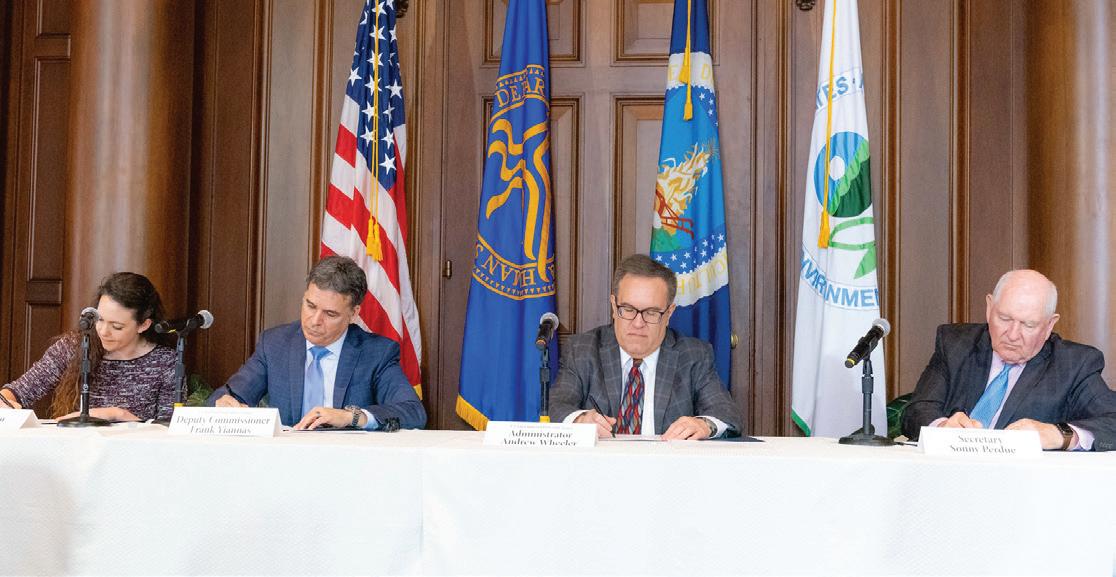
3 minute read
Letter From ReFED’s Executive Director
by ReFED
Dear Friends and Colleagues,
2010. Ten years ago, I became shocked by the amount of food going to waste and focused my career on this burgeoning problem. At the time, not many people were aware it was even happening, and they certainly weren’t talking about it.
2015. Five years ago, the United Nations adopted Sustainable Development Goal 12.3 to cut food waste in half by 2030. I couldn’t believe my eyes when I read it. During this same period, the idea was born for what became ReFED’s Roadmap to Reduce U.S. Food Waste by 20 Percent. The appetite for solutions for food waste was so large that we couldn’t stop at a report. We took on projects, convened people, and ultimately became a fullfledged organization thanks to a massive labor of love, time, resources, and brain power from a huge cadre of food waste warriors both within and beyond ReFED.

Though I only stepped in as Executive Director in November of 2019, I’ve been along on the ReFED journey since its inception, as an advisor, Steering Committee member, Board member, and allaround cheerleader. It’s been truly amazing to see the movement to end food waste grow, and watch ReFED come into its own as a catalyst, connector, and trusted data source in the sector.
There are so many incredible people dedicating themselves to this work, and we are seeing progress on a variety of fronts. A few milestones from 2019 alone include:
1. A strong public-private partnership emerges: The Pacific Coast Collaborative saw new members join its ranks, including Albertsons Companies’ West Coast divisions (Albertsons, Safeway, Vons, and Pavilions), The Kroger Co., New Seasons Market, and PCC Market.
2. New federal government commitment: In April, the EPA, FDA, and USDA announced the “Winning on Reducing Food Waste” interagency strategy with six key priority areas, from consumer education to measurement to internal action. ReFED is proud to be an official partner to this effort, with a formal agreement to evaluate and improve upon these strategies.
Photo credit: U.S. Environmental Protection Agency

3. Tangible progress at work: While we don’t have a solid nationwide progress report, we were excited to see The Kroger Co. publicly announce a nine percent reduction of their overall food waste footprint, Sodexo roll out food waste measurement in over 3,000 locations and tie its financing to food waste reduction metrics, and Apeel Sciences spread its shelf-life extending technology to 1,100+ stores.
Ten. Ten years. That’s what we have left to achieve our goal—a goal essential to mitigating catastrophic climate change effects, optimizing water usage, and enhancing the nutritional quality of food to feed our collective future. The first ten years that I worked on this flew by. We started a movement, but haven’t yet achieved the actual reductions that we need. These next ten must bring about bigger, bolder, and more tangible transformation.
2020. This year, we at ReFED aim to lay a foundation for our movement to work off of for the next decade. We will build and launch the Insights Engine—a data center to help catalyze action by tracking progress and fostering action. We will continue to accelerate innovation and attract capital to support it. And we will aim to enable our partners’ efforts as much as possible through community building at the 2020 Food Waste Summit.
The energy in this space is palpable. Now it’s time to put it to work and rewrite the script from awareness to action. There’s neither time nor food to waste!
Yours truly,

Dana Gunders Executive Director








